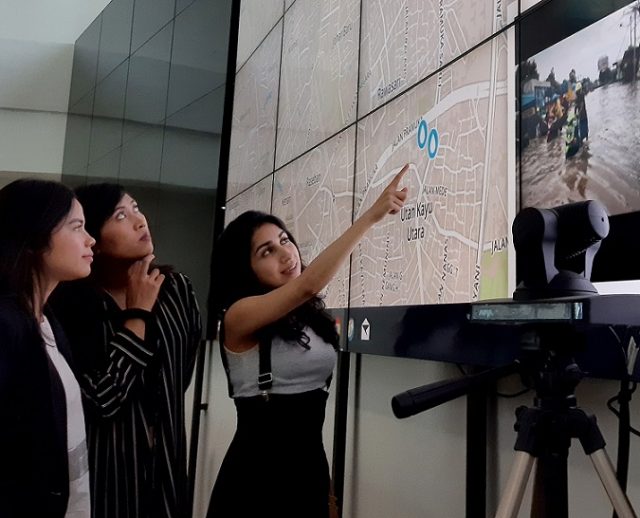
KUALA LUMPUR — Can bots save lives? An Indonesian architect who harnesses social media to improve disaster relief, a project that on Friday could win a $250,000 international award, believes so.
28-year-old Nashin Mahtani’s website, PetaBencana.id, uses artificial intelligence (AI) and internet bots to monitor posts on social media by communities hit by floods.
The information displayed on a real-time map is monitored by emergency services in the country frequently hit by earthquakes, tsunamis and volcanic eruptions.
“Jakarta is the Twitter capital of the world, generating 2% of the world’s tweets, and our team noticed that during a flood, people were tweeting in real-time with an incredible frequency, even while standing in flood waters,” said Mahtani, a graduate of Canada’s University of Waterloo.
Indonesia, an archipelago of thousands of islands, has about 81,000 km (50,300 miles) of coastline, making it particularly vulnerable to climate change along with neighbors like the Philippines.
It’s capital Jakarta is built on a swampy plain and regularly suffers from floods, not least because around 40% of the city sits below sea level.
Unlike other relief systems that mine data on social media, PetaBencana.id adopts AI-assisted “humanitarian chat-bots” to engage in conversations with residents and confirm flooding incidents.
“This allows us to gather confirmed situational updates from street level, in a manner that removes the need for expensive and time-consuming data processing,” Mahtani said.
Indonesia suffers hundreds of natural disasters every year and in 2004 was struck by an Indian Ocean tsunami that killed about 167,000 people.
The government spends an estimated $300 million-$500 million annually on rebuilding after disasters, according to the World Bank.
When disasters hit one conundrum is how to ensure information flows between residents, community groups, humanitarian agencies and the government.
“The transparency of the platform provides all (parties)… with free access to the same time-critical information needed to make informed decisions,” Mahtani said, adding: “this is collaborative resilience to climate change”.
Jakarta residents often share information with each other online about road blockages, rising waters and infrastructure failures.
PetaBencana.id monitors words linked to disasters that are posted on Twitter, Facebook, and Telegram.
The online platform founded in 2016 serves 50 million people including in Jakarta and four other major Indonesian cities.
In early 2020, the project will go nationwide to serve 250 million people and include additional disasters such as forest fires, haze, earthquakes and volcanoes.
Mahtani was named in early December as a finalist for the Global Citizen Prize which honors young activists working around the world to end extreme poverty using technology.
The winner will be announced on Friday at London’s Royal Albert Hall.—Reporting by Michael Taylor @MickSTaylor; Editing by Tom Finn, the Thomson Reuters Foundation









